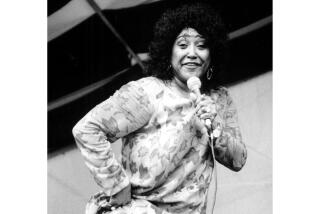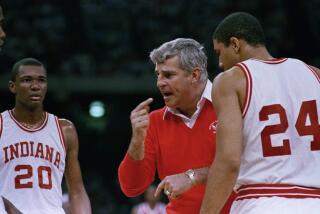Marie Knight dies at 84; gospel vocalist sang with Sister Rosetta Tharpe
- Share via
Marie Knight, a gospel singer who came to fame singing duets with gospel-music star Sister Rosetta Tharpe in the late 1940s and made a noteworthy late-in-life comeback as a solo artist, has died. She was 84.
Knight died Sunday of complications from pneumonia at a nursing home in Harlem in New York City, said her manager, record producer Mark Carpentieri.
With a voice that one recent reviewer described as “a natural wonder, an unadorned, powerful instrument,” Knight began her career touring the national gospel circuit with evangelist Frances Robinson as a young woman in the mid-1940s.
The guitar-playing Tharpe, a major recording artist on the Decca Records label who brought gospel music to a broad audience, first heard Knight sing at a Mahalia Jackson concert in New York in 1946. Two weeks later, Tharpe showed up at Knight’s house in Newark, N.J., to invite her to go on the road with her.
“She was a beautiful woman with a beautiful contralto voice, who had a spellbinding effect on audiences,” said Gayle Wald, who interviewed Knight for her 2007 biography “Shout, Sister, Shout!: The Untold Story of Rock-and-Roll Trailblazer Sister Rosetta Tharpe.”
Tharpe and Knight toured through the late ‘40s, appearing in clubs, arenas, churches and auditoriums.
“Sometimes the one-nighters and the traveling was a little rough,” Knight told the Times Union of Albany, N.Y., in 2005, “but on the stage was beautiful.”
Tharpe and Knight were best known for their classic gospel duets “Up Above My Head” and “Didn’t It Rain.”
“They had a dynamic, exciting sound where they traded off vocal lines,” Wald said. “That was a kind of hallmark with their duet singing, and it was so vocally agile that it approximated the sounds of jazz.”
After several years of recording together, Tharpe and Knight parted ways except for occasional on-stage reunions during the ‘50s, including performances at leading jazz clubs in New York City in 1955.
In the ‘60s, Knight pursued a rhythm-and-blues career and toured with Brook Benton, the Drifters and Clyde McPhatter. After a hiatus, she returned to recording gospel music in the mid-’70s.
Born June 1, 1925, in Sanford, Fla., Knight grew up in Newark. At age 5, she impressed the congregation at her parents’ church by singing the gospel song “Doing All the Good We Can,” and she later became a soloist in her church’s youth choir.
In late 2001, Carpentieri was producing a Tharpe tribute album for his M.C. Records label and Wald, who wrote the liner notes, asked if he was going to record a track with Knight.
“I said, ‘I thought she was dead a long time ago,’ ” Carpentieri recalled. “Gayle said, ‘No, she’s living in Harlem. You should call her.’ ”
Knight, a minister at her church, hadn’t recorded in many years.
“She would occasionally go out and do a gig or two, but she wasn’t really formally represented,” Carpentieri said. “I called her up, and she sounded so vibrant. I just booked the studio time, and it certainly was one of the highlights of the recording.”
“Shout, Sister, Shout!: A Tribute to Sister Rosetta Tharpe,” which featured Knight singing “Didn’t It Rain,” came out in 2003. Knight then began touring with tribute concerts to Tharpe, including a tour of Hawaii. She also began getting her own performance dates, Carpentieri said.
In 2007, M.C. Records released Knight’s first full-length recording in more than two decades, the critically acclaimed “Let Us Get Together,” featuring the gospel songs of the Rev. Gary Davis, with Larry Campbell, a guitarist who has toured extensively with Bob Dylan, playing all of the stringed instruments.
Reviewers praised her powerful and spirit-lifting vocals.
“Her delivery,” a reviewer for the San Francisco Chronicle wrote, “is soulful enough to surely cause some nonbelievers to want to get right with God.”
Last January, a month before Knight developed pneumonia, she and Carpentieri were recording an interview for the BBC in New York City. Knight was as vibrant as ever, saying to Carpentieri, “Mark, when are you going to get me some work?”
She is survived by her sister, Bernice Henry.
More to Read
Start your day right
Sign up for Essential California for the L.A. Times biggest news, features and recommendations in your inbox six days a week.
You may occasionally receive promotional content from the Los Angeles Times.






